Tourism has affected Thailand in so many ways, and there are many issues you’ll be shocked to learn about. As tourism in Thailand continues to skyrocket, it’s more important than ever to support ecotourism and travel sustainably. We’ve put together out best tips so you can travel more responsibly in Thailand.
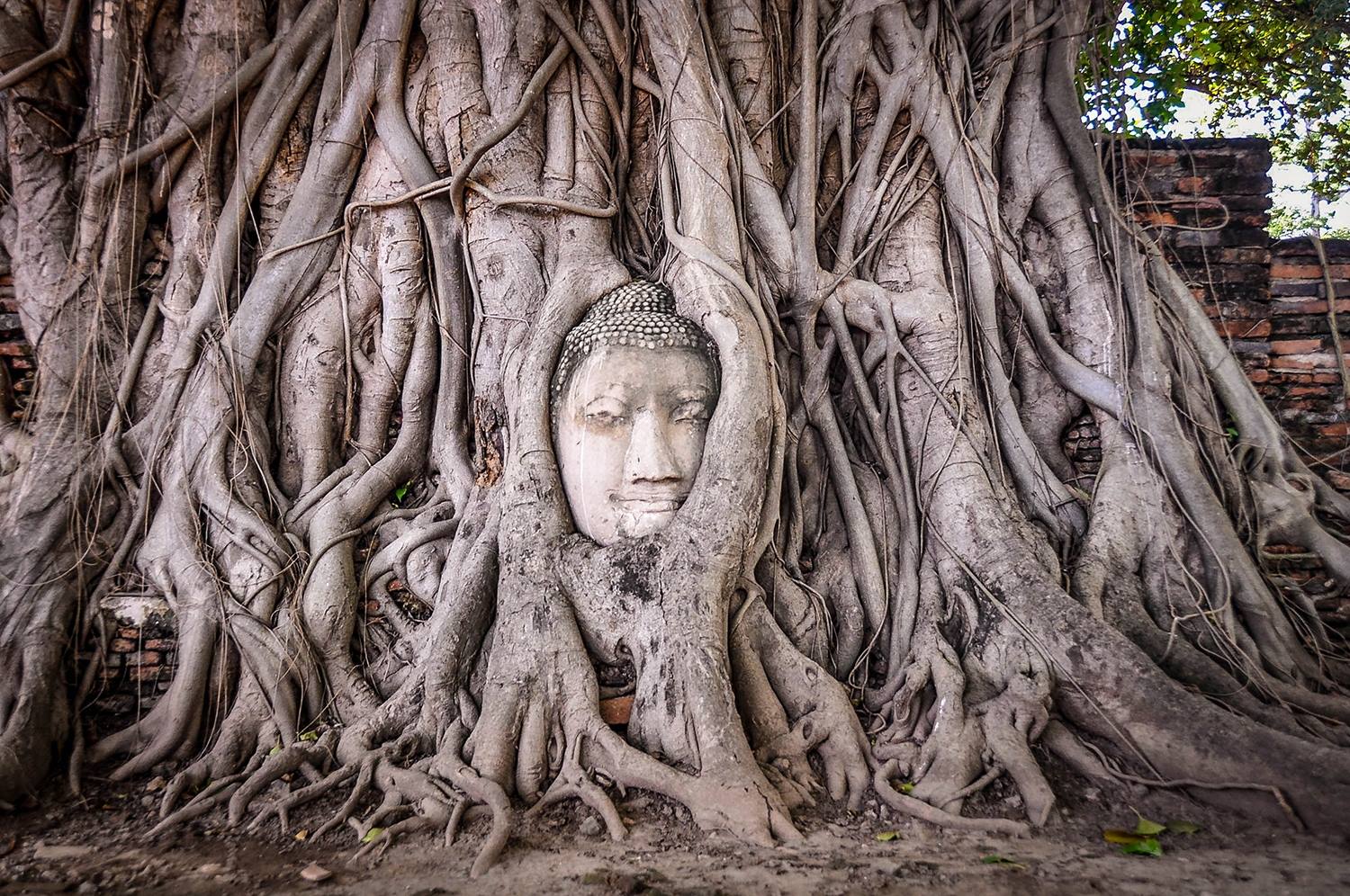
We have spent a lot of time traveling around Thailand and while we seriously love this country, there are many things that make us cringe.
I’m going to give it to you straight:
Tourism has had many negative effects on Thailand.
Animals are exploited of for the benefit of tourists and pristine environments have been compromised. Communities have been taken advantage of in the name of tourism and the nation faces water and air pollution.
As a traveler in Thailand you are contributing to these issues, whether you are aware or not. We, too, are guilty and have made mistakes.
But the good news is there are several things you can do to lessen your impact on your travels in Thailand.
Before hopping on a plane, read this article and educate yourself on the ways you can travel better.
1. Eat less seafood in Thailand
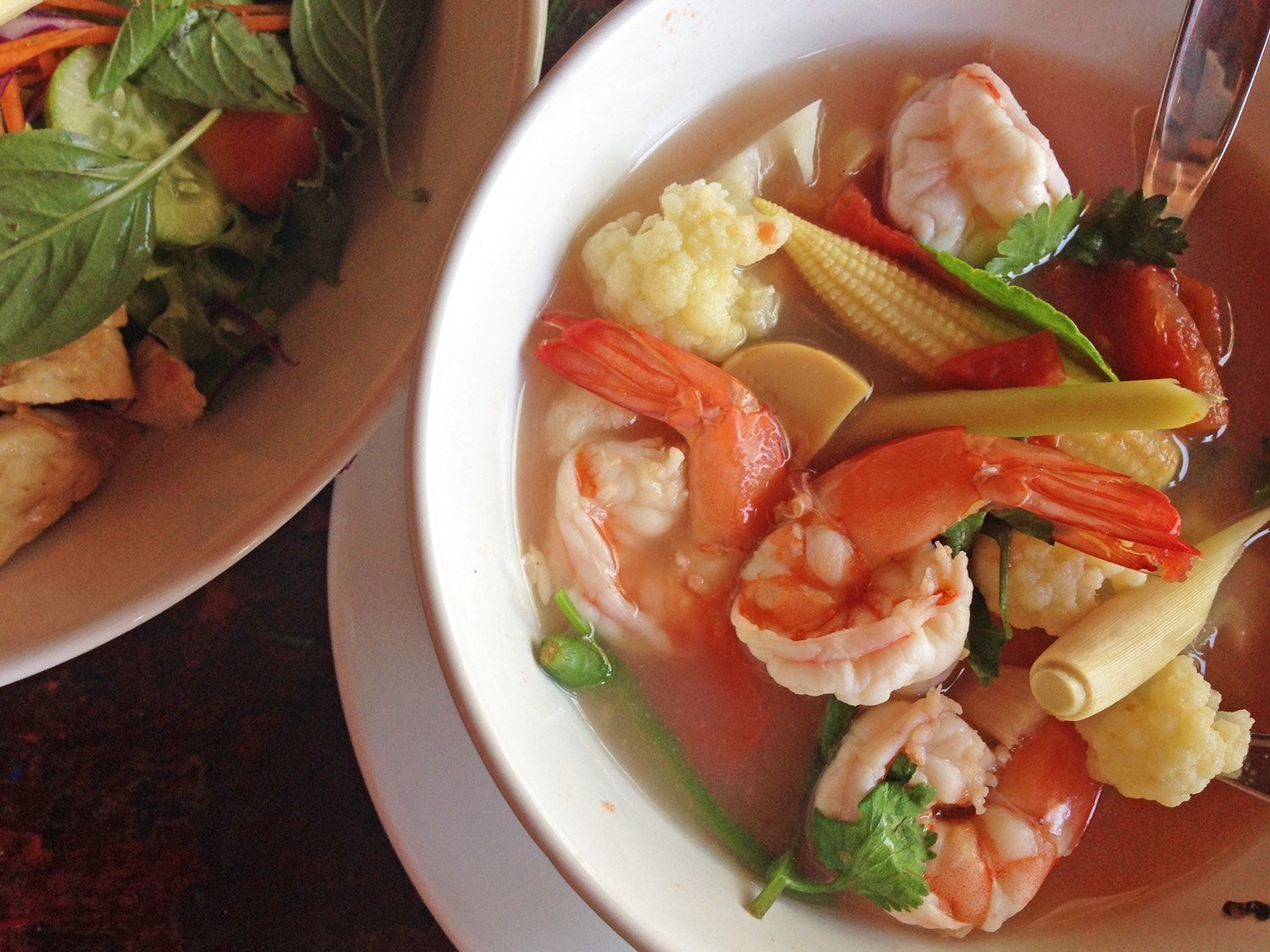
You may be dreaming of Pad Thai with shrimp (pad thai goong), a fresh grilled fish or Green Curry with seafood (kaeng khiao wan goong), and I don’t blame you — they’re delicious. But here’s something you may not know: Much of the seafood in Thailand is unethically sourced.
Two of the issues with seafood in Thailand are:
- Overfishing: The seas around Thailand have been drastically overfished. Some of the time, the methods used to fish can destroy the surrounding environment. For example, one method employed is to send electronic pulses into the water, which kills the fish in an area and sends them to the surface. This means many fish that aren’t even eaten are killed.
- Slave Labor: Thailand’s seafood industry has been exposed by human rights organizations for practicing forced labor and human trafficking. Back in 2014, migrant workers revealed that they had been enslaved, forced to work 20-hour shifts, were tortured and witnessed execution-style killings. The government claims to be cracking down on this issue, but according to some sources, many of these human rights violations are still happening.
Remember as a consumer, you are creating a demand. When there is demand for shrimp, for example, these methods will still be employed. Only when consumers refuse a product will things change.
I’m not going to pretend that we’re perfect. While living in Chiang Mai, we refrained from eating seafood (except for the few times we had sushi).
However, while traveling in the Thai islands, we ate a few dishes with prawns and had fish two times. But we consciously ate less than we normally would. We also try to eat seafood only from restaurants that have “sustainable fishing practices”. Baby steps, I know, but it is something.
What you can do:
- Eat less seafood. Instead of ordering shrimp at every meal, cut back and make it special. Or avoid it altogether.
- Support restaurants that advertise sustainable fishing practices.
Planning a trip to Thailand? Find out the best time to visit based on regional weather and events you don’t want to miss!
2. Be careful with Elephant “Sanctuaries”

Just about everyone that visits Thailand wants to see elephants. And I understand: They are beautiful, gentle creatures, and most of us have never had the opportunity to get close to them.
It is becoming more well-known that riding elephants is incredibly harmful to the animals, and less and less people are participating in this practice while in Thailand, which is wonderful. Instead, many people are now choosing to visit elephant sanctuaries while in Thailand.
The problem is this: Some businessmen and women have taken note of this demand, and have transitioned their elephant camps to “sanctuaries” in pursuit of money without really changing the way the elephants are treated.
What you can do:
- Don’t go elephant riding. At all. Period. If you want to know more about this issue, read this article from BBC or PETA or The Independent. Heck, a quick Google search will give you more horrifying information than you’d ever want to know…
- Do your own research of elephant sanctuaries. Check out reviews and read up on their practices. If they are vague, that can be a good indicator that they aren’t truly a sanctuary.
- Book your elephant experience in advance. The good sanctuaries only allow a small number of visitors per day and they fill up fast. If you wait, you risk having to book with whatever is available. Which won’t be a good option.
- Share YOUR experience. If you noticed bad things happening at the “sanctuary” you visited, write a review or email the organization. Mistakes happen, and you may have unintentionally supported a company that is more concerned about money than the animals’ wellbeing. The only way this is going to change is if you share this experience so others can choose whether or not they want to support it.
More information on Animal Tourism: Elephants aren’t the only animals being mistreated. While traveling in Thailand, you’ll likely see signs advertising places to pet tigers and watch monkeys jump through rings of fire. Our advice is to avoid animal encounters in Thailand unless it is a true sanctuary or rehabilitation center.
3. Think before visiting Hill Tribes
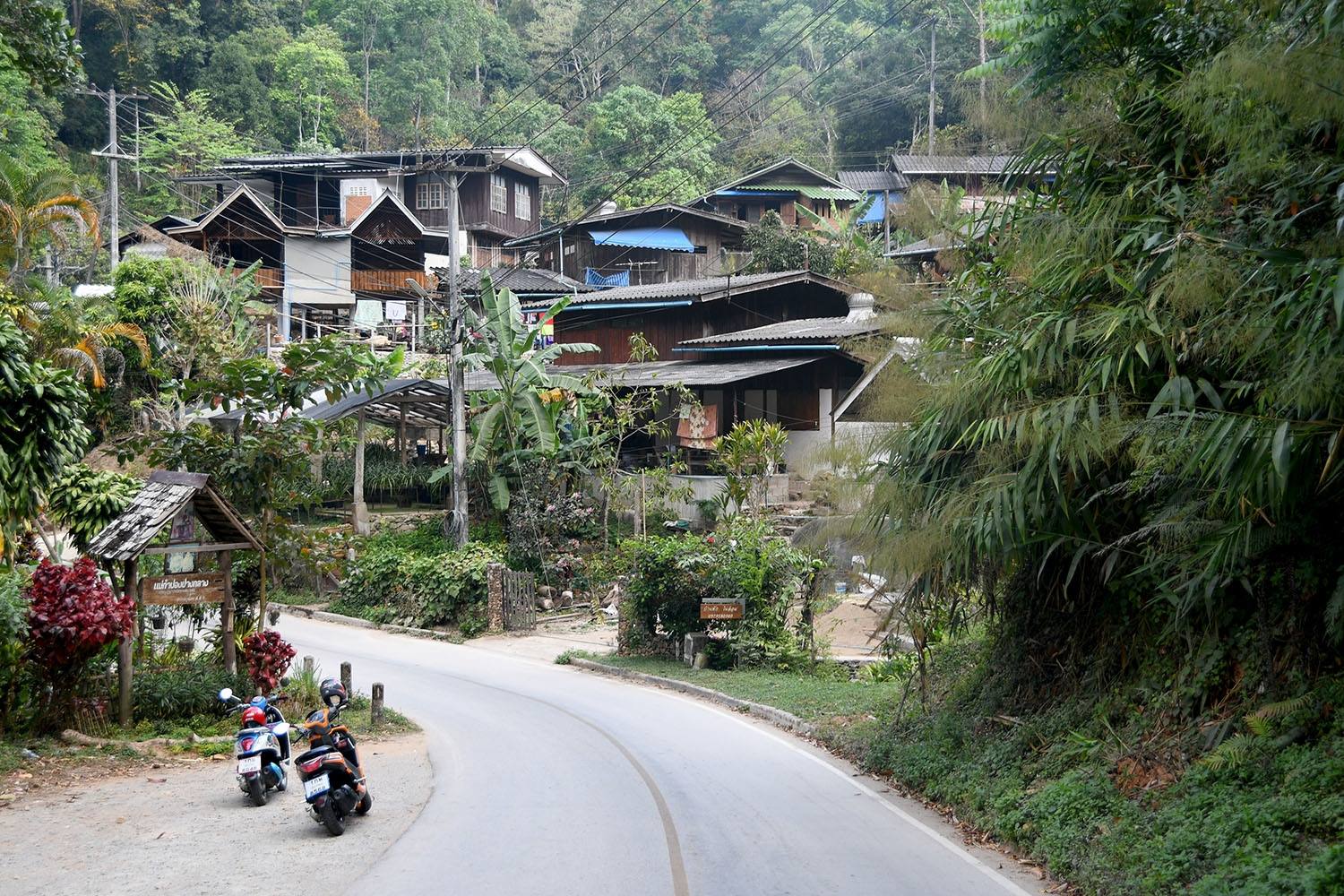
I get it — visiting hill tribes has a certain appeal, as it is an opportunity to experience a culture drastically different than your own. There are numerous tour operators in Chiang Mai, Pai and other parts of northern Thailand that sell packages that promise “up-close visits with long neck people”.
We have some ethical concerns about this type of tourism, and it just never felt right or authentic to us. For that reason have opted not to visit the hill tribes on a tour.
But that doesn’t mean it’s wrong or bad to visit.
Do your own research on this issue and make an informed decision. This article has an interesting perspective on hill tribes in Thailand and what it’s like to visit as a tourist.
What you can do:
- If you want to experience small villages, consider hiking or driving a motorbike through the countryside. Stop in a village and support the locals by getting lunch, buying a coffee or purchasing a handicraft.
- If you do choose to visit a hill tribe with a tour, be sure to choose a reputable company.
4. Avoid sex tourism
Unfortunately, Thailand is well-known for its sex tourism industry. Just watch the Hangover II and you’ll know what I’m talking about.
Know that some of the women (and men) who work in the sex industry are not working voluntarily. Visiting a ping pong show is likely supporting the sex tourism industry.
I’ll be honest: During my first visit to Thailand (back in 2011) a couple friends and I went to a ping pong show. I naively thought it would be similar to visiting a Strip Club in Vegas. I later learned that these shows are often intertwined in sex trafficking, and I am deeply embarrassed that I inadvertently supported this industry.
What you can do:
- Instead of seeing a ping pong show, consider going to a cabaret/burlesque show.
- Don’t support prostitution. Duh. This is especially common in some districts of Bangkok, Chiang Mai and Phuket.
5. Say No to Plastic
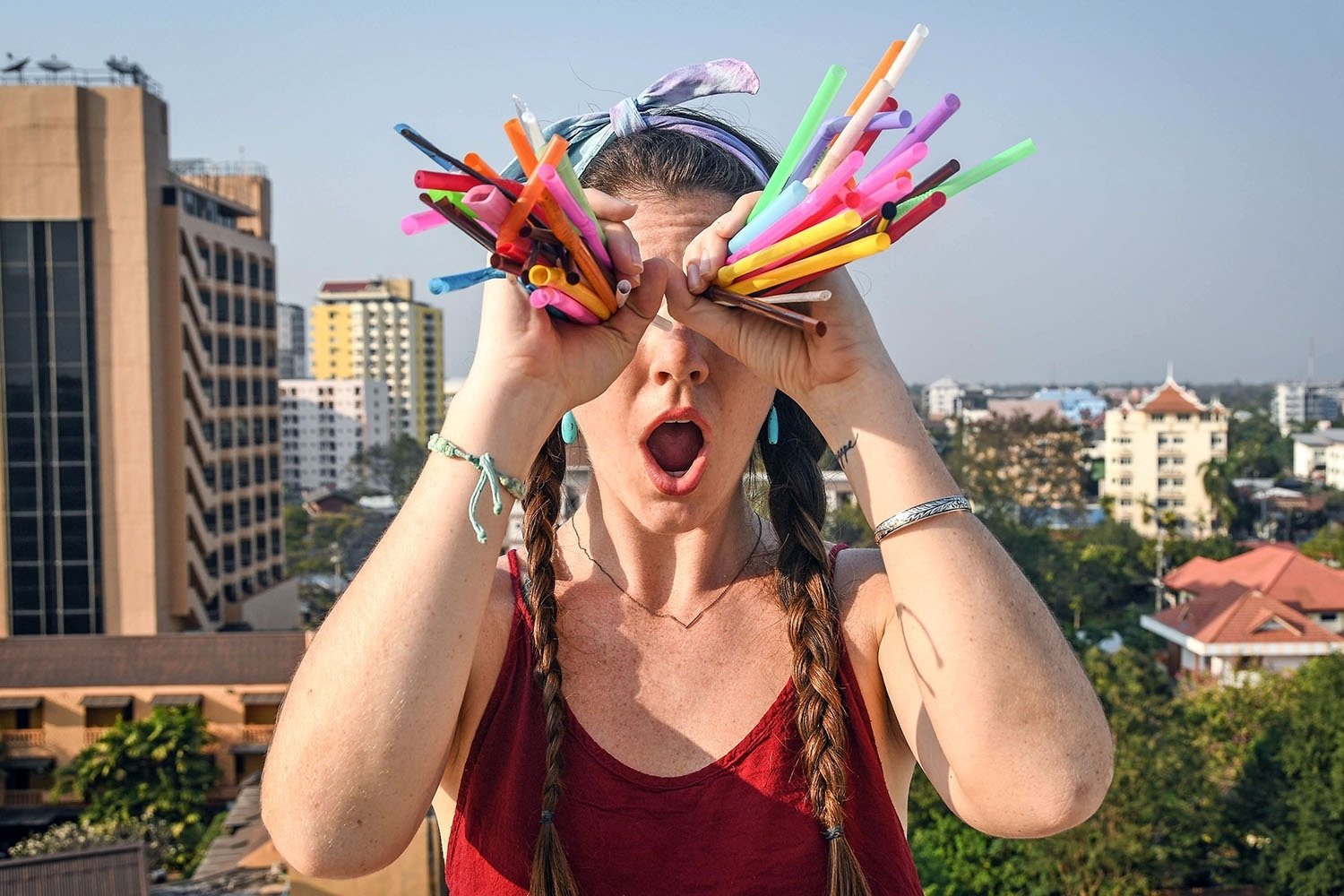
You are probably somewhat aware that plastic consumption in Southeast Asia is seriously out of control. Purchase one item at 7-Eleven, no matter how small, and it is placed in a plastic bag.
And even worse, order a drink from a street stand and it will come in a plastic cup with a plastic lid and have a plastic straw. Then, a plastic handle is attached and it is placed inside a plastic bag. That is 5 pieces of plastic for one fricken’ Thai iced tea. Ridiculous!
Start getting the the habit of saying no to plastic. And before you roll your eyes and say, “I’ll just recycle it,” hear me out.
Frankly, it is difficult to recycle in Thailand. Many cities don’t have the infrastructure easily accessible, and quite honestly, many travelers just don’t recycle when they’re vacationing.
In a recent study from Explore, a U.K.-based adventure travel tour operator, they found that only 37% of British travelers recycle when on vacation whereas 77% of them recycle when they’re at home.
Yes, recycling is a wonderful thing and it’s great to do it as often as possible. But it’s even better to just pass on plastic so you, like all those Brits in Explore’s study, aren’t tempted to toss a plastic bottle in the trash because you can’t find a recycling bin.
In their study, Explore noticed people often don’t follow the same environmentally-conscious practices they do when at home. In an effort to educate and encourage people to travel more responsibly, Explore created a 2018 Travel Pledge to be an example and resource for the tourism industry.
What you can do:
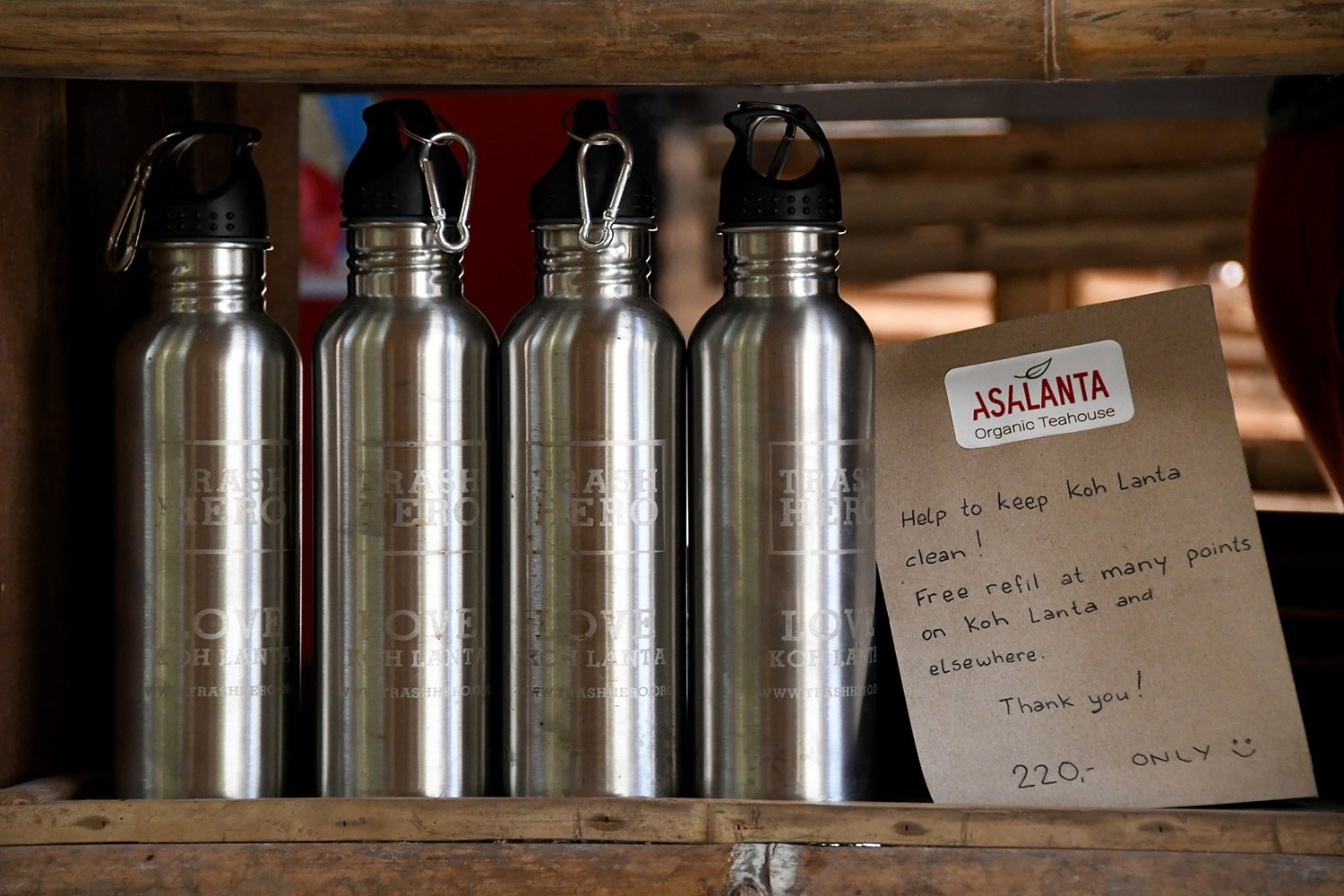
The best way to avoid plastic consumption is to be prepared:
- Bring your own reusable bag (There are tons on the market but we love this one from Tree Tribe because it stuffs up super small, is made with recycled materials and 10 trees are planted with your purchase)
- Carry a reusable straw and memorize this phrase (you will definitely need it!):
- If you’re a woman: “mai ao lawd ka” = I don’t want straw, please.
- If you’re a man: “mai ao lawd kap” = I don’t want straw, please.
- Travel with a water bottle and refill it when possible. Many hotels have a large jug you can use. You can also find refill stations on the streets that are very cheap. We’ve also used our Steripen in Thailand to sterilize water from the tap to make it safe from drinking. And when you have no other options, buy the big 5-liter jugs of water from the convenience store to refill your bottle instead of those tiny 16-ounce ones. Not only will you save plastic, but it’s cheaper too!
- If you do get plastic on vacation, please go out of your way to recycle it properly.
Read More: Eco Friendly Travel Gear – this packing list will help you travel more sustainably!
6. Be responsible at Full Moon Parties

We’re not going to sit here and preach that you shouldn’t participate in a Full Moon Party. We did it once, and we had fun.
But, I will say this:
Full Moon Parties in the Thai islands are responsible for an incredible amount of waste. Like, a disgusting amount.
We woke up the day after the party and walked along the beach to find all sorts of stuff — straws, water bottles, Styrofoam, shoes, condoms — floating in the ocean.
What you can do:
If you choose to take part in the debauchery (we’re not judging; it can be fun once in a lifetime experience), be conscious about your own waste. There’s not much you can do about anyone else in their varied states of inebriation, but you can take responsibility for your own actions.
- Throw rubbish in the bins instead of on the ground. Duh.
- Carry your own reusable straw and refuse the plastic ones in buckets (they often put a handful of dirty straws in one bucket!).
- Participate in a beach cleanup the morning after. Doesn’t sound all that glamorous, but it can be eye-opening and will prevent some of the waste from reaching those fishies and beautiful coral reefs.
7. Say no to shark products
Shark fin soup is commonly sold in Bangkok’s Chinatown, and while trying it may sound like something to “tick off the bucket list”, we urge you to reconsider.
Several species of sharks are on the brink of extinction, and activists blame their endangerment largely on the demand for shark fin soup.
Did you know that an estimated 1 million sharks are killed each year? Many of these sharks have their fins cut off then are thrown back into the ocean to bleed to death. We learned about this on our Similan Islands liveaboard dive trip because the company we booked with, Wicked Diving, is a partner with Shark Guardian, an charity that supports the education and protection of sharks.
Sharks are a very misunderstood animal, and people often don’t realize that they are an essential part of the marine ecosystem. Plus, their bad rep is not exactly deserved – more people die each year in toaster accidents than in shark attacks.
What you can do:
- Don’t eat at restaurants that serve shark fin soup.
- Don’t buy shark souvenirs (like shark teeth).
In recent years, shark products have become harder to find in Thailand, but they’re still there. Be a conscious consumer and avoid them.
Related: Read more about shark products at Fin Free Thailand.
8. Be careful underwater
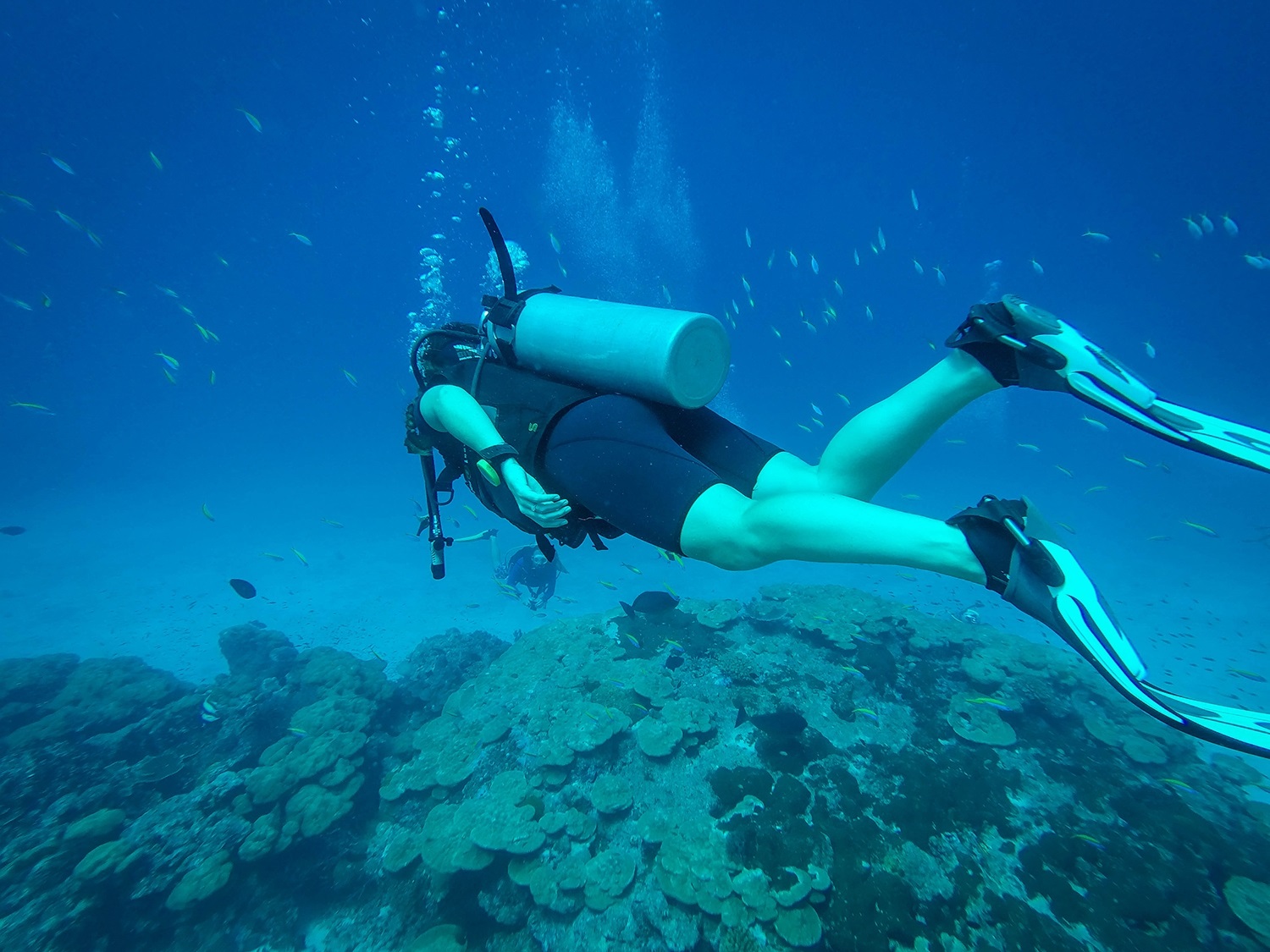
Thailand is a fantastic place to experience the underwater world! Koh Tao is famous for quality yet inexpensive Scuba certification courses (we got certified there and had a great experience!), and many of the Thai islands boast wonderful diving and snorkeling.
However, with so many tourists putting on masks and fins and jumping in the ocean, it’s more important than ever to be a responsible diver or snorkeler.
What you can do:
- Don’t feed fish! It’s not natural for them to eat bread or bananas or whatever else you’re giving them. They can find food for themselves and it can be harmful for them to learn to take food from humans.
- Don’t touch or pick up any marine life. We’ve gone on a few snorkeling trips where the guides have picked up starfish to show us, but it rubbed us the wrong way. Touching them or moving them can cause them harm, and there’s no reason we need to manipulate them.
- Don’t touch or stand on coral. Be sure only to stand on sand or rocks. It can cause irreparable damage when humans stand on coral. And touching the reefs transfers oils from our hands that are not natural underwater. Be a passive observer instead!
- Choose dive companies that are eco conscious! For example, we did a 3-day scuba liveaboard trip in the Similan Islands and found there were a ton of companies to choose from. We ended up booking our trip with Wicked Diving because they have very strict environmental policies.
Wherever you are diving in the world, it’s important to be aware of how you are treating marine life.
Looking for a Liveaboard diving experience? We put together a detailed guide to diving in Thailand including our recommended Liveaboards for every budget.
9. Choose tour companies wisely
When booking tours, be sure to do some research.
While doing your research, be wary of “green washing” (aka companies that claim to be environmentally conscious without following through).
We’ve seen firsthand that many companies or hotels put buzzwords like “green” or “eco” in their name without doing anything to mitigate their impact on the environment. If a company claims to be sustainable, they should be able to answer questions like:
- “What is this company doing to lessen its carbon footprint?”
- “How are you giving back to your local community?”
- “How will my money be used for improving and protecting the environment?”
We have a lot of power when we choose companies. Remember that you are essentially “voting” with your money.
When you support a company that does not respect the environment, you’re telling them it’s okay to continue these practices. However, when more and more consumers choose responsible companies, the competition will notice and start making positive changes as well.
What you can do:
- Research companies before booking a tour
- Be willing to pay a little more to choose a company that is environmentally conscious
- Spread the knowledge. When you find a company that is doing good, praise them. Write reviews online too so other travelers can support them. And if you notice a company is not following through on their promises, talk to them about it and write a review online so other guests can choose whether or not they’d like to support the business.
10. Participate in a beach clean up
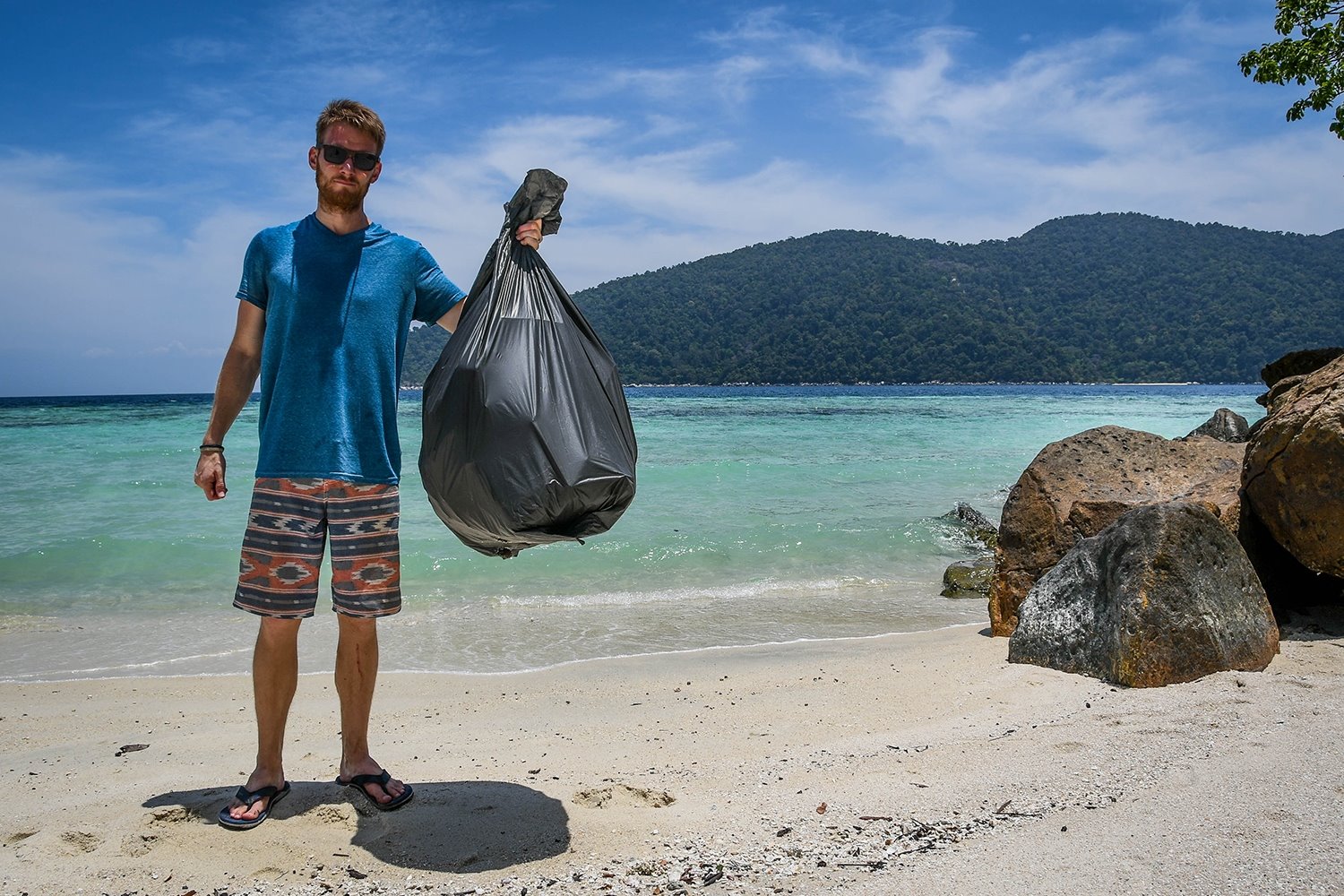
If you want to really make a difference while traveling in Thailand, consider participating in a beach clean up. Trash Hero is really cool organization that leads weekly clean ups all around Southeast Asia.
We participated in a beach clean up while staying on Koh Lipe and had a really good, eye-opening experience. We felt like we made a tangible difference (even if if was small!) and saw firsthand how much trash actually washes up on even the most remote islands.
What you can do:
- Plan to do a beach clean up during your trip! Check out Trash Hero’s website for more details.
- Tell other travelers you meet along the way about the beach clean ups. The more people that know the better!
- Trash Hero accepts donations and also sells t-shirts and reusable water bottles. If you can’t donate your time, consider supporting with a donation or purchase.
11. Avoid flights when possible
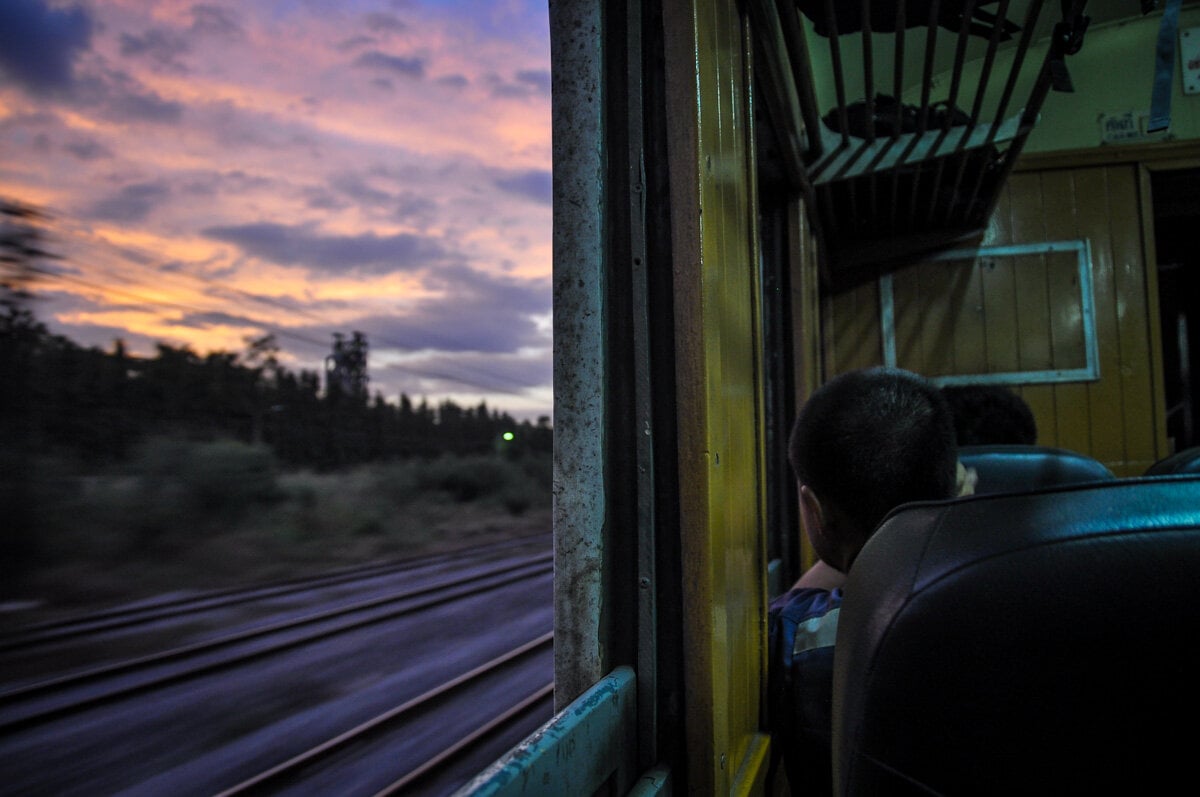
Getting to Thailand will require a flight for most travelers. But once you’re in the country, it is very easy to travel via bus, shuttle, ferry and train! We’ve taken all the above, and not only are they better for the environment (saving lots of CO2 emissions compared to flights), but they’re super cheap modes of transport too.
If you have the time to travel slowly, avoid taking flights within Thailand. You might even come away with an adventurous story that would never happen had you taken a regular flight.
Responsible Travel Related Articles:
- What is Sustainable Tourism?
- Eco-friendly Product for Responsible Travelers
- 33 Responsible Travel Tips
- How to Plan a Sustainable and Eco-friendly Trip
- How Much is Your Selfie Worth?
Traveling in Thailand?
We have TONS of resources on travel in Thailand and destinations throughout the country.
Check out our Ultimate Thailand Travel Guide for all the answers to your most burning questions, or read some of our favorite articles below:
- Perfect Thialand 2-Week Island-Hopping Itinerary
- Absolute Best Things to Do in Chiang Mai
- Things to Do in Koh Lipe: Thailand’s Island Paradise
- Unique & Cheap Things to Do in Bangkok
- Epic Things to Do in Pai, Thailand
Don’t miss your chance to grab our Thailand Packing Checklist!
If you’re planning a trip to Thailand, we have the ultimate resource for you!
This FREE PDF download includes everything you’re going to want to pack for your trip to Thailand, plus tons of insider tips!
Sign up for our ultimate Thailand packing list now and get a copy sent straight to your inbox.
Tell the world how to travel sustainably in Thailand. Share it on Pinterest!
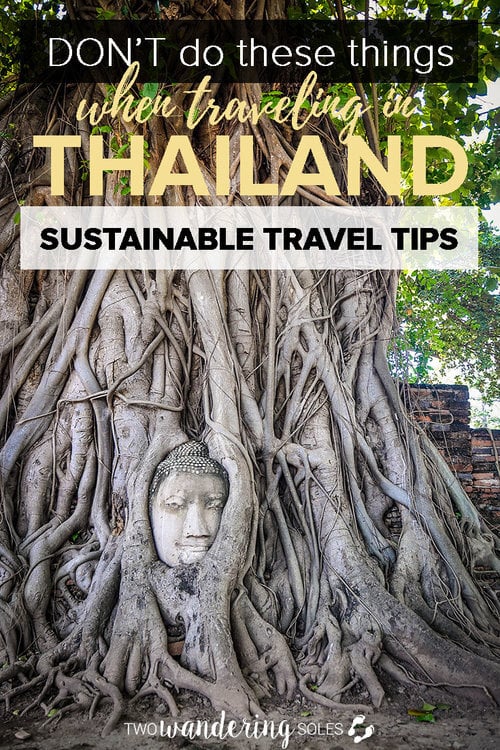
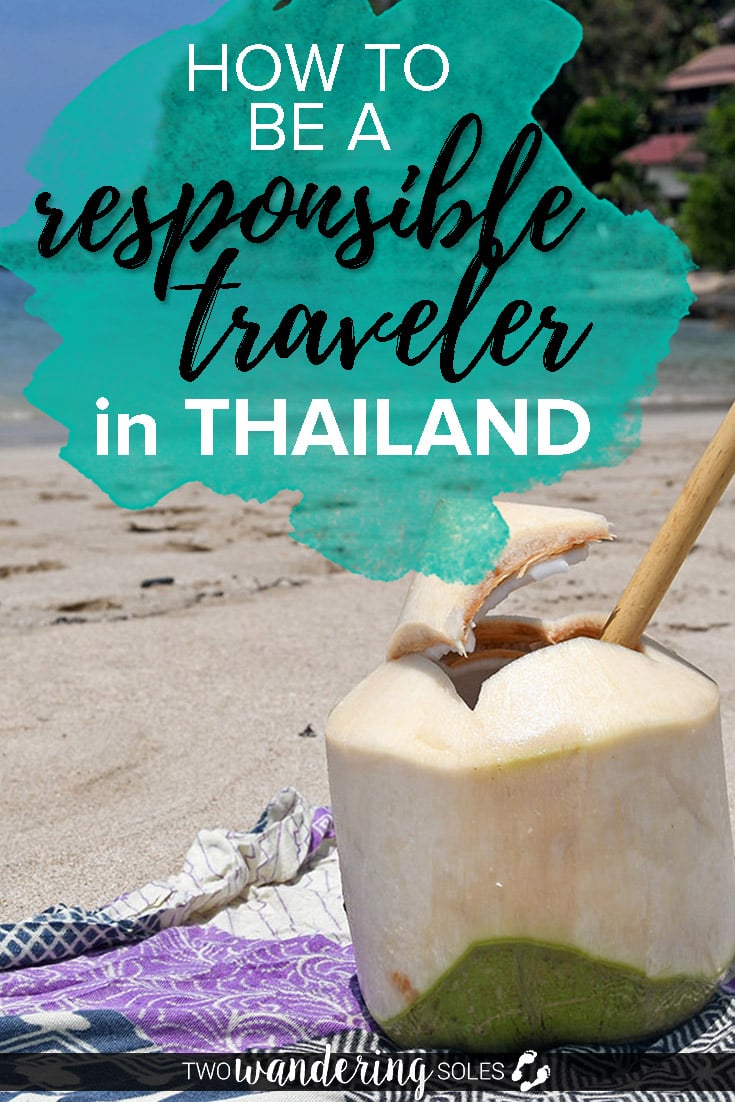
We want to hear from you!
Did you learn anything from this article? Do you have any other tips for sustainable travel in Thailand? We’d love to hear from you in the comments below!

Katie Diederichs is the lead writer and co-founder of Two Wandering Soles, where she creates in-depth travel guides, itineraries, and tips designed to help readers plan better trips with confidence. With a background in journalism, photography, and design, she combines thorough research with firsthand experience to deliver clear, practical, and visually driven travel content. As the primary trip planner, Katie turns complex logistics into easy-to-follow advice travelers can actually use.

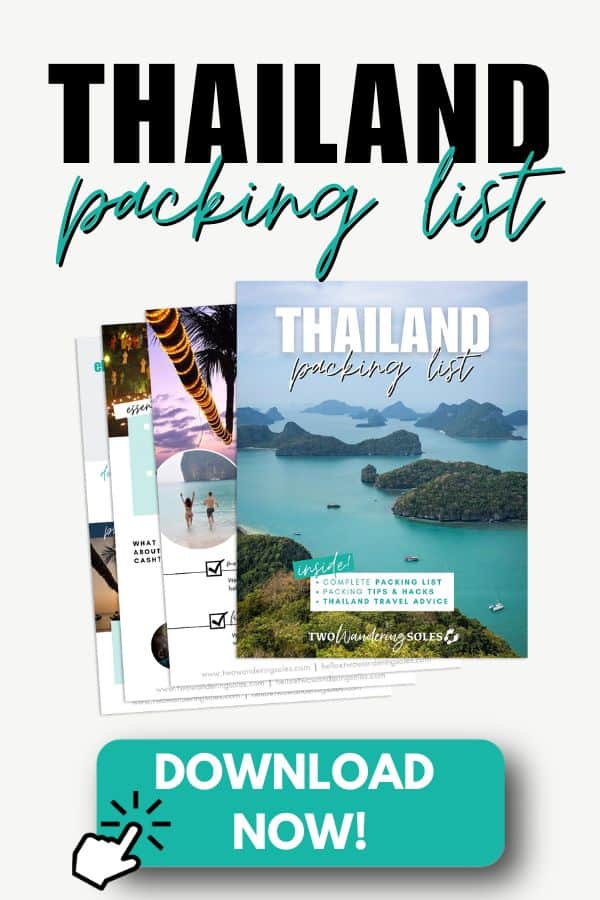
Great Travel guide about Thailand.
I love Thailand and I would go back there with great pleasure, but tourism is starting to have such a bad impact in this country. The elephant are abused and many tourists don’t know about it (or don’t care), pollution is a real problem (if you wonder late in the city you’ll see the street filled with so many waste and everything is plastic). The sex traffic is very famous in this country and indeed I never realized those "ping pong shows" were contributing to it in a way … so thank you for the article !
Hey Steven, We also love Thailand, but you’re right, there are somethings where tourism has really made a negative impact. But hopefully as more and more people become informed about these issues, the demand for the bad things will go away.